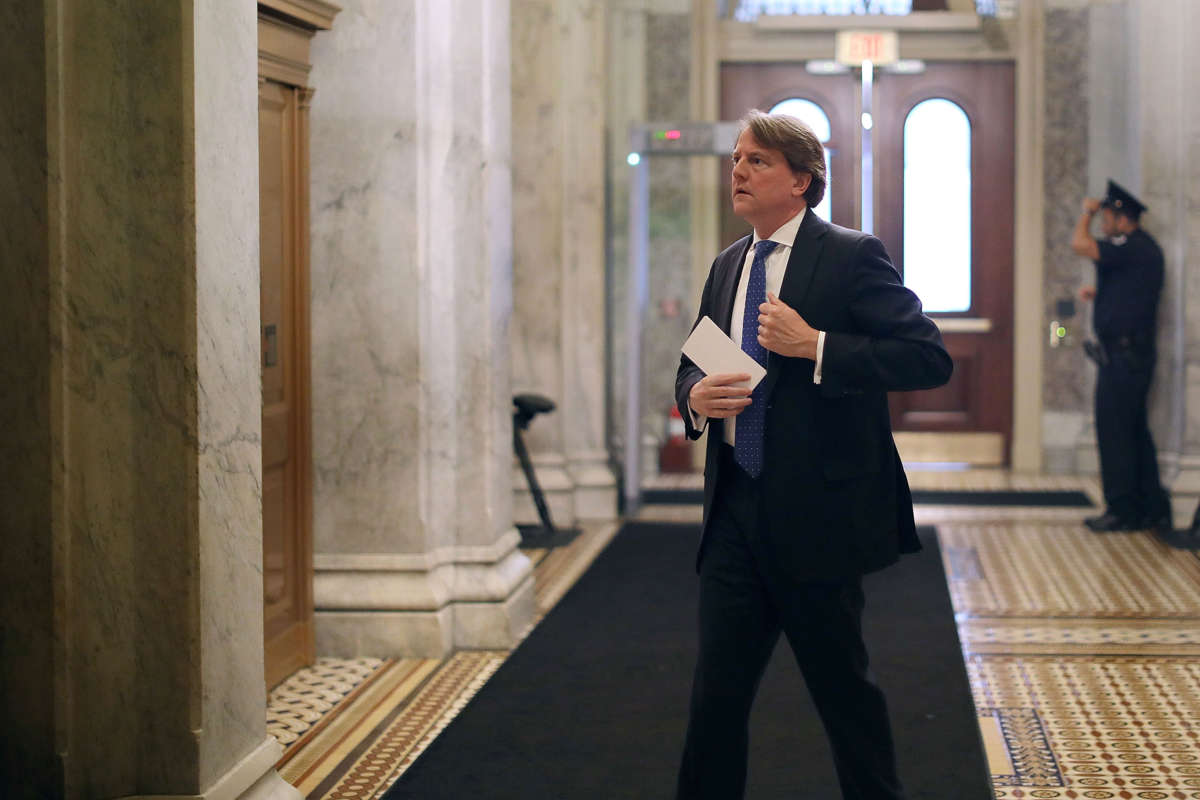Days after voting to impeach President Trump, lawyers for the House Judiciary Committee told a federal court that lawmakers are open to impeaching the president again.
House counsel Douglas Letter said in a court filing that a second impeachment may be necessary if the committee discovers new evidence that Trump tried to obstruct investigations. The filing came after the Justice Department argued to the D.C. Circuit Court of Appeals that Democrats do not need a speedy resolution in a lawsuit seeking to force former White House counsel Don McGahn to testify because the House has already impeached the president.
“If McGahn’s testimony produces new evidence supporting the conclusion that President Trump committed impeachable offenses that are not covered by the Articles approved by the House, the Committee will proceed accordingly — including, if necessary, by considering whether to recommend new articles of impeachment,” Letter said in the filing.
The filing also argued that McGahn’s testimony could be key in the upcoming Senate impeachment trial.
“McGahn’s testimony is critical both to a Senate trial and to the Committee’s ongoing impeachment investigations to determine whether additional Presidential misconduct warrants further action by the Committee,” Letter wrote.
The DOJ argued that there is no longer an urgency to resolve the case because the House has already approved articles of impeachment.
“The reasons for refraining are even more compelling now that what the Committee asserted — whether rightly or wrongly — as the primary justification for its decision to sue no longer exists,” the filing said.
The filing argued that the court should not involve itself in the case.
“If this Court now were to resolve the merits question in this case, it would appear to be weighing in on a contested issue in any impeachment trial,” the DOJ lawyers said. “The now very real possibility of this Court appearing to weigh in on an article of impeachment at a time when political tensions are at their highest levels — before, during, or after a Senate trial regarding the removal of a President — puts in stark relief why this sort of interbranch dispute is not one that has ‘traditionally thought to be capable of resolution through the judicial process.’”
“This Court should decline the Committee’s request that it enter the fray and instead should dismiss this fraught suit between the political branches for lack of jurisdiction,” the lawyers added.
Another Justice Department filing in a case brought by the Judiciary Committee seeking former special counsel Robert Mueller’s grand jury evidence argued that the decision to approve articles of impeachment rendered the issue moot.
“Neither article of impeachment adopted by the House, however, alleges high crimes or misdemeanors stemming from the events described in the Mueller Report. Accordingly, nothing appears to remain of the Committee’s alleged need for the grand-jury materials in the Mueller Report,” the second filing said.
House Democrats argued in their own filing that the grand jury material “bears on the current Articles of Impeachment and could accordingly be used in a Senate trial on those Articles, and because the Committee is continuing to conduct its inquiry into whether the President committed other impeachable offenses.”
The appeals court is reviewing the case after a lower court instructed McGahn to comply with a House subpoena.
McGahn was a crucial witness in Mueller’s investigation into whether Trump obstructed justice during the Russia probe and provided more than 30 hours of testimony.
McGahn testified that Trump directed him to have Mueller fired multiple times, though McGahn said he resisted and threatened to quit, according to Mueller’s report. McGahn also testified that Trump tried to get him to issue a false statement rejecting reports that the president had ordered Mueller’s firing, which McGahn also refused multiple times.
Mueller detailed 10 instances of possible obstruction of justice that Congress could pursue since Justice Department guidelines argue that a sitting president cannot be indicted.
Mueller concluded that Trump’s efforts to obstruct justice were “mostly unsuccessful” but said that was “largely because the persons who surrounded the President declined to carry out orders or accede to his requests.”
Our most important fundraising appeal of the year
December is the most critical time of year for Truthout, because our nonprofit news is funded almost entirely by individual donations from readers like you. So before you navigate away, we ask that you take just a second to support Truthout with a tax-deductible donation.
This year is a little different. We are up against a far-reaching, wide-scale attack on press freedom coming from the Trump administration. 2025 was a year of frightening censorship, news industry corporate consolidation, and worsening financial conditions for progressive nonprofits across the board.
We can only resist Trump’s agenda by cultivating a strong base of support. The right-wing mediasphere is funded comfortably by billionaire owners and venture capitalist philanthropists. At Truthout, we have you.
We’ve set an ambitious target for our year-end campaign — a goal of $180,000 to keep up our fight against authoritarianism in 2026. Please take a meaningful action in this fight: make a one-time or monthly donation to Truthout before December 31. If you have the means, please dig deep.
